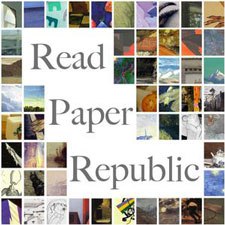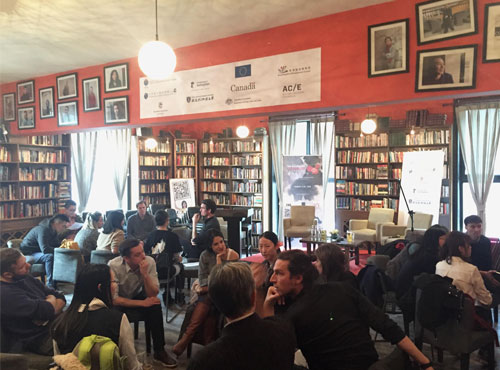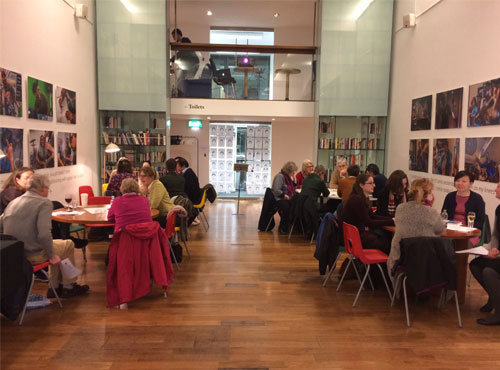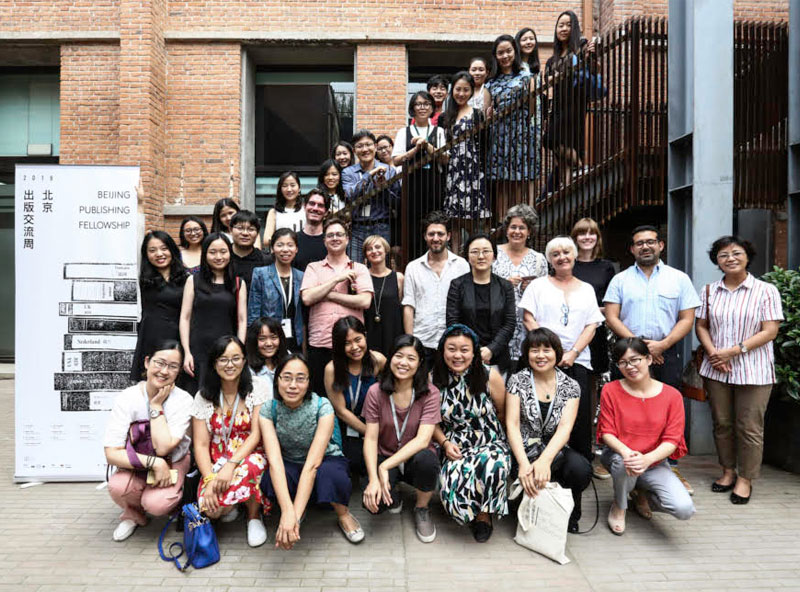ILS: Tell Us about Paper Republic

Paper Republic is a website dedicated to contemporary Chinese literature in translation. ‘If you're looking for China's coolest authors, books and literary events, Paper Republic is the place,’ as it says on our Facebook page. Specifically, we are a collective of translators from Chinese who believe passionately in our craft, and in the need to make Chinese literature better known in the west.
For the purposes of this blog, we are, in alphabetical order: Eric Abrahamsen, Nicky Harman, Dave Haysom, Emily Jones, and Helen Wang.
ILS: For literature to thrive on a global scale, do we need translators most of all?
Eric: I think translators are almost always the first point of contact, and the most important connection between cultures and literatures. By definition they are the ones who stand in the middle and understand both sides. If they are willing to do more than simply translate the books, then they have the potential to be the most effective evangelists for literature from other countries.
ILS: Does that mean the translator’s most important job is to promote ‘world’ literatures?
Eric: Realistically speaking, particularly when it comes to lesser-known languages, the translators are absolutely crucial to providing the necessary guidance. That’s something we’ve tried to do explicitly with Paper Republic. That takes the form of information on the website itself, the database and various readings, or our forthcoming Field Guide to Contemporary Chinese Literature. The Field Guide will be an attempt to give readers a general overview of the past fifty years of Chinese literature, to provide a framework into which they can fit other names and titles they come across.
'A translator must be the best of writers in their first language.'
It also takes the form of creating direct publishing industry connections, for instance with the annual Beijing Publishing Fellowship we started running this year – that brings 10 international editors to Beijing for a week, to get to know Chinese literature and publishing firsthand. We think this is crucial for actually getting books sold.
These programs are well beyond what a translator normally does. In fact, what we’re doing is usually done by government-level national-promotion bodies. But as things worked out, we’re the ones doing it.
Dave: Taiwan offers a positive example of how institutions can help. In addition to running the Taipei Rights Workshop – which inspired Eric to start the Beijing Publishing Fellowship – Gray Tan’s Grayhawk Agency and the Ministry of Culture produce Books From Taiwan, a regular publication that provides translated extracts from books that are likely to appeal to an international audience. They’ve also produced special editions dedicated to graphic novels (in collaboration with translator Nick Stember) and children’s literature.
ILS: Must a translator thus be both an exceptional reader and an exceptional writer?
Nicky: I feel very strongly that a translator must be the best of writers in their first language. (I’d take for granted their depth of knowledge of the other language.) I wince every time I read something in translation that sounds awkward, or even ungrammatical, where the original is not intentionally awkward. It must be said that editors have a responsibility here. A good editor is a translator’s best reader, and can pick up on awkward-sounding bits during the editing process, go back to the translator and query them.
Helen: Yes, it’s so important to have a good editor. As a translator, you have to think about the author and the reader at the same time; when translating, you need to get inside the text, but for the final version you need enough distance to be able to look at your translation objectively. I also think it’s important to match translator and author carefully – as translation slams show so vividly, different translators can produce very different translations of the same text.
Dave: You can get away with being a less-than-perfect reader, so long as you’re aware of your own weaknesses: there are plenty of crutches (dictionaries, other people) to help you along with comprehension. But your writing has to be able to stand up on its own.
Eric: They must certainly be good writers. I think the ability to write well in one’s native language is by far the most important skill a translator can have. After that, an ability to ‘feel’ literary style and voice in the original language. A dictionary or a native-speaker friend can take care of everything else.

ILS: How do we ensure that the best writing reaches readers, regardless of its original language?
Helen: Word of mouth – when someone enthuses about a book, that is one of the best ways to spread the news. When enough champion a book this way, the momentum can be significant.
'A great book needs the right translator.'
Eric: I would endorse what Helen said: word of mouth, and advocacy. We’re living in a time of too much information, too many choices, and guidance is crucial. I believe that readers are far more likely to take a chance on a book if they’re hearing a voice they can trust and understand, explaining what the book is and why it’s worth their time. Many different people can play this role, but I believe that translators can potentially do it better than anyone.
Dave: But despite the best intentions of everyone involved, there’s still a frightening amount of luck involved in the whole process. A great book needs the right translator; it needs a publisher with a thorough understanding of the book itself and its potential readers (and how to get it to them); and it needs to be fortunate enough to garner the kind of reviews or prizes that will start to attract more general interest. An incredible work of literature can drift into obscurity if any part of that process goes awry.
Nicky: I believe that translators have a great deal of interesting things to say about their books and should be called on more often to work on publicity.
ILS: What, if anything, do you think automated translation/machine translation (AT/MT, for short) has to offer Chinese-to-English (C-E) literary translators?
Nicky: In my view, nothing much. Run a paragraph of Chinese through Google Translate and more than likely you won’t even understand the gist of it. The more interesting question is, why not? Put simply, AT/MT works in two ways, by ‘learning’ rules of syntax and applying them (eg subject + verb + object, for English) and by mining online databases for matching bilingual phrases. Syntax: C-E AT/MT seems to be incapable of handling one basic grammar construction in Chinese, the 的particle that puts a clause before its noun rather than after. (Chinese: ‘the wearing-a-blue-hat-的-woman’. In English, ‘the woman who was wearing a blue hat’.) But there is an even more basic problem: Chinese ‘words’ usually consist of two, three or four characters, not just one. Before AT/MT parses a sentence of, say, ten characters, it needs to know which ones belong together as a ‘word’. And that’s before it tackles the problem of whether the ‘word’ functions in that sentence as a noun, an adjective or a verb. (Of course, Chinese is not unique in that ambiguity. The English word ‘slave’ can be all three as well, ‘a slave’, ‘to slave’, and ‘slave cylinder’.) Bilingual databases: these are not much use for literary translation either; common sense tells us that to create a database, you need online literary texts in the original and in translation, and they need to contain usefully large numbers of matching phrases. That said, I did once find AT/MT useful when I was translating an economics book: there were a few intelligible matches, presumably because economics texts in many languages are plentiful and freely available online. Here’s an example: Google Translate gave me this translation for ‘熵向我们表明,物质与能量只能沿着一个方向转换’: ‘Entropy shows us that matter and energy can only be converted in one direction,…’ Very nice, and perfectly correct. Unfortunately the rest of the sentence was gobbledegook, so it was back to using my brain-power again! For those who would like to know more about Chinese and AT/MT, I recommend this blog by Mark Wilbur, especially the Comments section.
ILS: How do we develop translators effectively?
Eric: Translators need two things: mentorship, and career advice. I don’t think academic training is very useful for translators, but I do think that watching another translator work, talking over the process, can be invaluable, particularly for new translators. It’s good not to be always working in solitude! And advice on the business end of things is very important: how to pitch books, how to negotiate contracts, all that. Most people get into translation out of a love of literature, and those sorts of people don’t necessarily know much about how the publishing industry works.
'What keeps me going [...] is the community and kindred spirit I’ve found in the translators I’ve met.'
Helen: In terms of helping to develop dynamic young translators, there’s professional training in literature translation – MA courses and summer schools (for example, City University London’s Translate in the City, and the Translation Summer School at Writers’ Centre Norwich and UEA). Translation competitions have an impact too, and are helping to launch, or develop, careers in literary translation (for example, those run by the Writing Chinese Project at the University of Leeds, and Harvill Secker Young Translators’s Prize) and mentoring is making an impact too.
Nicky: International Translation Day (at the end of September) and the London Book Fair’s Literary Centre (14-16 March 2017) run always-popular panels on ‘Getting Started in Translation’. Then there are summer schools, translation competitions, and mentorships. Writers' Centre Norwich runs the best-established mentorship scheme. Antonia Lloyd Jones, who has been a mentor for the last five years, believes that it has done more to increase the number of literary translations from Polish than anything else in that time - it provides emerging translators with the practical skills and contacts they need to work professionally, as well as helping them with translation techniques. Of course, many experienced translators act as informal mentors, sometimes through co-translating with less-experienced ones.
Emily: What keeps me going and what, I hope, keeps me improving as a translator, is the community and kindred spirit I’ve found in the translators I’ve met. There’s the Emerging Translators Network where you can ask questions on anything from ‘how does the industry work’ or ‘what makes a good reader’s report’ to ‘exactly what does this word mean’. I wish there were a simple online course that can guarantee to turn you into a writer of sparkling, award-winning prose. While I wait for someone to set it up, I content myself with practice. The more you read, the more you write, and the more you ask other people to read what you’ve written, the better you become as a translator.
Dave: Just like all forms of writing, translation takes practice, and I think the best way to learn is by doing. So the more opportunities there are for emerging translators to hone their skills without pressure or a fear of failure, the better!
ILS: What do you think should be the relationship between translator and writer?
Eric: I don’t think there necessarily needs to be much of a relationship between the two. It can be helpful for a translator to query the writer about the original text, but often that kind of relationship can be awkward instead of helpful. I do think it’s important that the translator have access to native speakers of the source language, ideally native speakers with a good understanding of literature. But in most cases, I think that’s all that’s needed.
Nicky: I like to have contact with an author in case I have questions. In a couple of cases, I’ve had discussions about my translation with a writer whose English is good, and that can be a very fruitful relationship.
Helen: It varies. The constant element is that the translator has an obligation (contractual) to represent the writer. The question is how best to achieve that.
Dave: Ultimately you have to remember that the eventual reader of the book is the person you’re actually writing for! A good translation needs creativity, and that can be hard to achieve if you constantly feel the author’s gaze over your shoulder. You need to have the confidence in your translation to defend it when necessary, and not assume that the author always knows best. A good work relationship needs trust, rather than deference.

ILS: What is happening in the UK and internationally that is exciting, innovative, or impactful that people or organisations are doing?
Helen: In the UK there’s a strong translator community, including the Translators Association and the Emerging Translators Network, annual events at International Translation Day and the Literary Translation Centre at the London Book Fair, The Poetry Translation Centre is active and London’s Free Word Centre and has established itself as a translation venue.
Internationally, there is a lot happening too. For example, the Global Literature in Libraries Initiative (GLLI) is bridging the gaps between translators, publishers and librarians. Librarians are keen to have translated fiction in their libraries, but often don’t have the resources and information they need to know which books to order, and where to source them. Translators often have that knowledge, but don’t have channels through which to share it. So, bringing together different people in the publishing process is a great way to proceed.
Online, people are taking on board the need to collect data – how many translations, by whom, which languages, and so on. Paper Republic compiles and posts a list of translation from Chinese every year, as does Chad Post in his Three Percent databases of translations from all languages. Collecting data enables us to see the situation more accurately, and then to work together more effectively. And it can be used to make statements and arguments and apply for funding.
Nicky: Social media platforms have been wonderful for bringing translation people together. Meytal Radzinski’s Women in Translation campaign has done a huge amount, not just for women in translation, but for translation generally. Online literary translation journals such as Asymptote and Words without Borders also do great work commissioning and posting free-to-view quality translations. And Paper Republic posts free-to-view translated short stories under the rubric Read Paper Republic.
Participants: The team at Paper Republic: Eric Abrahamsen, Nicky Harman, Dave Haysom, Emily Jones, Helen Wang.
Photographs supplied by Chen Dongmei.








